PIB Headquarters
National Press Day 2025
Empowering Voices, Strengthening Democracy
Posted On:
16 NOV 2025 10:47AM by PIB Delhi
Key Takeaways
- National Press Day, celebrated on November 16, marks the start of the Press Council of India.
- The number of registered publications in India has grown significantly, rising from 60,143 in 2004-05 to 1.54 lakh in 2024-25.
- The Working Journalists Act, 1955, along with recent reforms like the Press and Registration of Periodicals Act 2023, protect journalist rights and modernize media regulation.
- The Press Sewa Portal has digitized periodical registration, onboarded 40,000 publishers, and registered 3,000 presses within six months, easing business for publishers.
- PRP (Press and Registration of Periodicals Act) 2023 and Press Sewa Portal modernize and digitize periodical registration, easing business for publishers.
|
Introduction
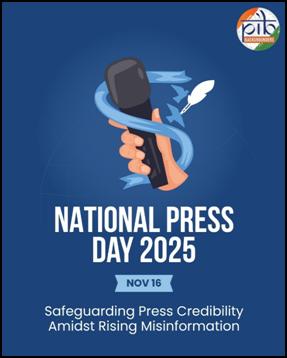
On November 16, India celebrates National Press Day, honouring the essential role of a free and responsible press in our society. The media is often referred to as the fourth pillar of democracy, playing a crucial role in shaping public opinion, driving development, and holding power to account. As a powerful tool for progress, it is essential that the press remains free from bias and upholds its duty to inform and educate the masses. For years, the media has been at the forefront, safeguarding the interests of millions and fostering transparency.
Roots of National Press Freedom
National Press Day (16 November) marks the establishment of the Press Council of India in 1966 under the Indian Press Council Act, 1965. The 1965 Act was later repealed in 1975, and a new Act, was subsequently enacted. Under this new legislation, the Press Council of India was reconstituted in 1979. Established as an independent body, the PCI’s primary role is to ensure that the press maintains high standards of journalism while remaining free from external influences. The idea for the Council was first proposed by the First Press Commission in 1956, which emphasized the need to protect press freedom and promote ethical reporting.
India’s vibrant media landscape continues to grow, registered publications have risen from 60,143 in 2004–05 to 1.54 lakh in 2024–25, reflecting the expanding reach and strength of the press.
This day symbolizes a free and responsible press, central to democracy. It is commemorated through various activities, including the National Awards for Excellence in Journalism and the release of a Souvenir.
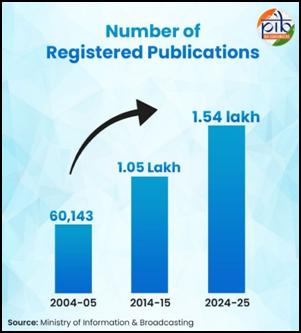
The National Award for Excellence in Journalism honours outstanding contributions in print media. Presented annually on National Press Day, these awards recognize exceptional journalists across various fields, with the prestigious Raja Ram Mohan Roy Award serving as the highest honour.
The Souvenir is a compilation of goodwill messages from leaders and opinion pieces from media experts and academics on the theme of the year. Released on National Press Day, it highlights the achievements of awardees, showcasing their work through articles and photographs.
Media Governance: Key Initiatives and Legal Reforms
India’s media governance framework comprises a robust set of institutions, laws, and initiatives designed to safeguard press freedom, strengthen ethical journalism, modernise regulatory processes, and support media professionals. From statutory bodies like the Press Council of India and the Press Registrar General of India to landmark reforms such as the PRP Act, 2023 and the digital Press Sewa Portal, along with dedicated training institutions and welfare schemes, this ecosystem collectively upholds the integrity, accountability, and development of the country’s media sector.
Press Registrar General of India (PRGI)
Established in 1956, the Press Registrar General of India (PRGI) is linked to the rise of the print media in India. The print media, especially newspapers, has long nurtured India’s democracy by informing the public, analysing social issues, and driving social development. With an illustrious history, it continues to keep citizens engaged on matters that affect them. As the body overseeing periodical registration, it remains a partner in this legacy and ongoing progress.
Previously known as the Registrar of Newspapers for India or RNI, PRGI is a statutory body as per the Press and Registration of Periodicals Act, 2023.
The press played a vital role in shaping public opinion and in channelizing the energy of people in India’s struggle for independence. Aware about the role of the print media in the freedom struggle, and the part it could continue to play in strengthening democracy, the Government of free India set up the First Press Commission in 1956. The commission was mandated to examine the state of the Press in India and to make recommendations for its all-round development in the long term.
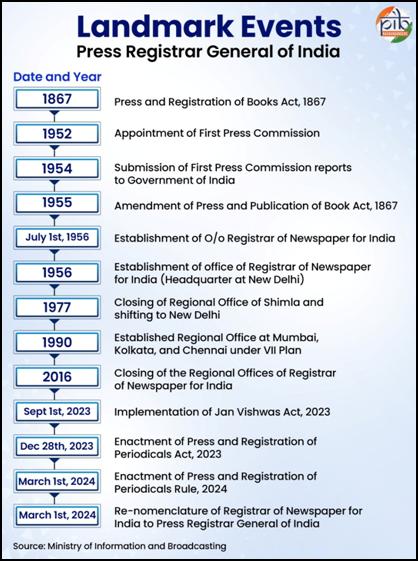
Press Council of India (PCI)
Press Council of India (PCI), a statutory autonomous body, has been set up under the Press Council Act, 1978 mainly to preserve the freedom of the Press and improve the standards of newspapers and news agencies in the country. PCI considers complaints filed 'by the Press' concerning curtailment of press freedom, physical assault/attack on journalists etc. under Section 13 of the Press Council Act 1978 and processed under the provisions of Press Council (Procedure for Inquiry) Regulations, 1979. PCI is also empowered to take suo-motu cognizance in matters on the pressing issues concerning freedom of Press and safeguarding of its high standards.
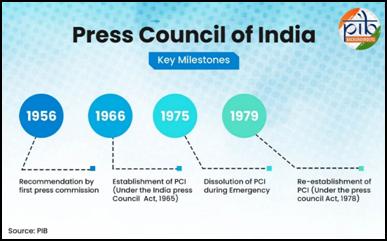
The Press Council of India (PCI), since its inception, has taken significant strides in shaping the landscape of press freedom and ensuring that the media in India upholds high ethical standards while remaining independent. Here's a brief overview of the Council's key developments and initiatives over the years:
- 2023: Representation of LGBTQ+ Community: The PCI adopted a report on the representation of the LGBTQ+ community in the media, promoting fair and responsible coverage.
- 2023: Guidelines for Reporting on Natural Disasters: The Council formulated guidelines for media professionals covering news during natural disasters, emphasizing sensitivity and accuracy in reporting.
- The PCI continued its advocacy for journalistic ethics by updating its Norms of Journalistic Conduct, ensuring that journalists adhere to professional and ethical standards over the years.
International Engagement:
- The PCI has signed MoUs with press councils from countries like Indonesia, Nepal, Bangladesh, and Sri Lanka, aimed at fostering mutual cooperation and advancing press freedom globally.
Internship Programs and Educational Initiatives:
- The PCI introduced merit-based internships for journalism students to foster a sense of responsibility and awareness regarding press freedom. The Summer Internship Program (SIP) and Winter Internship Program (WIP) offer students an opportunity to engage with the PCI's work.
The PCI's activities and initiatives reflect its ongoing commitment to protecting press freedom, upholding ethical standards, and supporting the professional development of journalists across India and internationally.
Did you know?
The Norms of Journalistic Conduct issued by the Press Council of India (PCI) serve as the guiding framework for ethical reporting in the print media. Newspapers are required to adhere to these norms, which, among other provisions, discourage the publication of fake, defamatory or misleading news. The Press Council is empowered under Section 14 of the Press Council Act to inquire into alleged violations of these norms and may warn, admonish or censure newspapers, editors or journalists, as appropriate.
Press and Registration of Periodicals (PRP) Act, 2023
The Press and Registration of Periodicals Act, 2023 (PRP Act), notified on 29 December 2023 and enforced from 1 March 2024, modernises and replaces the colonial PRB Act, 1867. It introduces a fully online, integrated system for simultaneous title allotment and registration, implemented through the Press Sewa Portal. The Act renames RNI as the Press Registrar General of India (PRGI), streamlines procedures, removes physical interfaces, reduces compliance burdens, and decriminalizes procedural lapses. The accompanying PRP Rules, 2024, provide the operational framework, together creating a transparent, efficient, and contemporary regulatory system for periodicals.
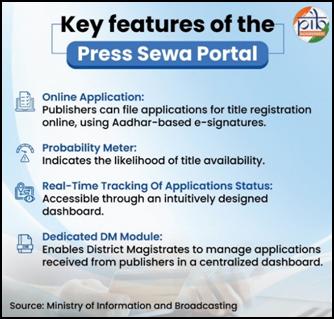
Press Sewa Portal
The Press Sewa Portal, developed under the Press and Registration of Periodicals Act, 2023 (PRP Act, 2023) by the Press Registrar General of India (PRGI), has ushered in a fully digitized and paperless system for the registration and regulation of periodicals. By automating all procedures, the portal has enhanced transparency, efficiency, and ease of doing business in the publishing sector.
The Portal has transformed the registration and regulation of periodicals with a fully digitized, paperless system and enhances the ease of doing business for publishers. With 40,000 publishers onboarded, 37,000 annual statements filed, and 3,000 printing presses registered within six months, reflecting its strong adoption. A dedicated website complements the portal, providing access to essential information and featuring an AI-based chatbot for user-friendly interaction.
Benefits of Automation
- Online services for title registration and related approvals.
- Paperless processing with e-sign facilities.
- Integrated Direct Payment Gateway for seamless transactions.
- QR code-enabled digital certificates ensuring authenticity.
- Dedicated module for Press Keepers to register and update press details online.
- Real-time tracking of registration status.
- Chatbot-based Grievance Resolution System for quick redressal.
Together, these features reflect the government’s commitment to streamlining media registration and ensuring a transparent, accountable, and technology-driven ecosystem for publishers across India.
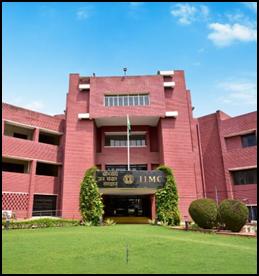
Indian Institute of Mass Communication (IIMC)
Inaugurated on August 17, 1965, the Indian Institute of Mass Communication started with a small staff, including two consultants from UNESCO.
In the first few years, the Institute organised training courses mainly for Central Information Service Officers and undertook research studies on a modest scale. In 1969, a major international training programme, the Postgraduate Diploma Course in Journalism for Developing Countries, for middle-level working journalists from Afro-Asian countries, was started. Various specialised short courses of one week to three months' duration were subsequently started by the Institute to meet the training needs of communication professionals working in various media and publicity outfits of the Central and State Governments and public sector organisations. Over the years, IIMC started to offer regular Post-Graduate Diploma Courses.
The Indian Institute of Mass Communication (IIMC) entered into a Memorandum of Understanding (MoU) with Shri Lal Bahadur Shastri Rashtriya Sanskrit Vidyapeetha (SLBSRSV) in September, 2017 for jointly conducting a three-month Advanced Certificate course in Sanskrit Journalism. The Certification is given jointly by SLBSRSV and the IIMC. The Certificate Course in Sanskrit Journalism started in February, 2018. The Indian Institute of Mass Communication conducts Post Graduate Diploma Courses in Urdu, Odia, Marathi and Malayalam. By introducing specialized journalism programs and expanding linguistic offerings, IIMC is fostering an inclusive media ecosystem and demonstrating its commitment to nurturing tomorrow's journalists and empowering diverse voices in Indian media.
Since its inception, the institute has organized a total of 700 such courses and trained over 15,000 persons from India and abroad. The Indian Institute of Mass Communication stands as a cornerstone in shaping skilled media professionals, continually empowering Indian and international journalists to uphold values of ethical journalism.
In 2024, the Ministry of Education declared IIMC New Delhi along with its five regional campuses situated in Jammu (Jammu & Kashmir), Amravati (Maharashtra), Aizawl (Mizoram), Kottayam (Kerala), and Dhenkanal (Odisha) as Deemed to be University under the distinct category. With this elevated status, IIMC is empowered to confer degrees, including doctoral degrees.
Journalist Welfare Scheme
The scheme was originally launched in the year 2001, and revised in 2019. The main objective of Journalist Welfare Scheme (JWS) is to provide financial assistance to the journalists and their families under extreme hardships. Assistance available under the scheme:
- Up to Rs. 5 lakh to family in case of journalist’s death due to extreme hardship.
- Up to Rs. 5 lakh to journalist in case of permanent disability.
- Up to Rs. 3 lakh for treatment of major ailments (cancer, renal failure, heart surgery, angioplasty, brain hemorrhage, paralytic attack, etc.), subject to non-coverage under CGHS/insurance; not available to non-accredited journalists above 65 years (age may be relaxed by Committee).
- Up to Rs. 2 lakh for accident-related serious injuries requiring hospitalization, subject to non-coverage under CGHS/insurance; for non-accredited journalists, assistance for (ii), (iii), (iv) limited to Rs. 1 lakh for 5 years of work, plus Rs. 1 lakh for every additional 5 years, up to the prescribed ceiling.
The Working Journalists and Other Newspaper Employees (Conditions of Service) and Miscellaneous Provisions Act, 1955
This Act regulates the conditions of employment for working journalists and non-journalist newspaper employees. It covers key aspects such as hours of work, leave entitlements, and wage fixation. The Act also provides for the constitution of a Wage Board to revise and determine wage rates in the newspaper industry.
The Employees’ Provident Funds & Miscellaneous Provisions Act, 1952
This Act has been applicable to newspaper establishments since 31 December 1956 and was extended to private-sector electronic media companies in December 2007. Employees in these establishments are entitled to social security benefits under the EPF schemes. Additionally, print and electronic media personnel earning up to ₹21,000 per month in units covered under the Employees’ State Insurance (ESI) Act, 1948 are eligible to avail themselves of ESI benefits as per their entitlements.
Conclusion
National Press Day 2025 celebrates the vital role of a free, responsible, and independent press as a pillar of democracy, emphasizing its contribution to transparency, accountability, and public awareness. With landmark initiatives such as the Press and Registration of Periodicals Act, 2023, and the fully digital Press Sewa Portal, the government has modernized and simplified the registration process, fostering ease of doing business for publishers. The Press Council of India and Press Registrar General of India’s continued efforts to uphold ethical journalism, promote inclusivity, and engage internationally reinforce India’s commitment to a vibrant media ecosystem. This day serves as a reminder of the enduring importance of press freedom in strengthening democracy and empowering citizens. National Press Day 2025 stands as a tribute to the media’s unwavering dedication to informing and educating the nation.
References:
Ministry of Information and Broadcasting
Press Council of India
Press Registrar General of India
PIB Backgrounders
Ministry of Labour and Employment
Press Information Bureau
Click here to see PDF
****
SA
(Release ID: 2190470)
Visitor Counter : 4629